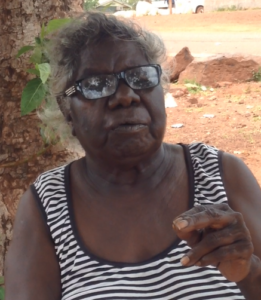
“Dilaknha walalawurru dirramu walal dhu dhäruk-bakmaram. Ga balanya liŋgu mulkurr bawa’mirr mala. Yuwalk dhäwu. Bäyŋu wala li ga bilyun ga waŋa ŋunhi yolthu ga gur’kuryun. Walal dhu waŋa ŋunhi walal ga napurruny barrtjunmaraman communitylil ŋunhi ga loudspeakeryu dhu ga waŋa, napurruŋ ga bilyun communitylilnha bilil walal ŋunhi ga mulkurr rurrguyun balanday walal, ŋunhili banydji djämaŋur. Nhä napurr ŋuli ga dhäkay-ŋäma ŋunhi walal ga announce? ga yätjkurrkum ŋayaŋu bartjunmaraman. Dilaknha walalawurru walal dhu dhäruk-bakmaram.”
“It should only be senior people who can make an announcement (on the loudspeaker). Those other people (who make announcements) are crazy. True story. They don’t turn and tell us who is pushing them to talk on the loudspeaker to discipline the community. Their brains have been washed by the Balanda back there in their workplace. What do we feel when we hear that announcement? A bad feeling hitting our insides. Only senior elders have the right to break news.”
Bepuka is drawing attention to the way in which care should be taken when using the loudspeaker, and delivering government messages in Galiwin’ku. Who is on the loudspeaker? Who has given them permission? Is it a message that Yolŋu should to pass to other Yolŋu? Has the message been discussed and negotiated, so that Yolŋu are confident that it is for their benefit? If not, it is likely to cause pain and bad feelings amongst the Yolŋu who hear it.